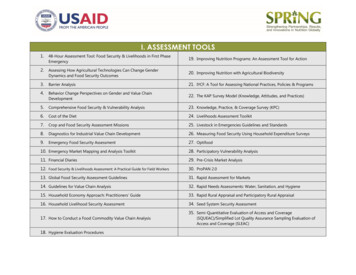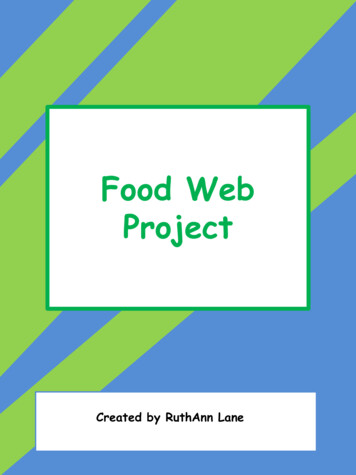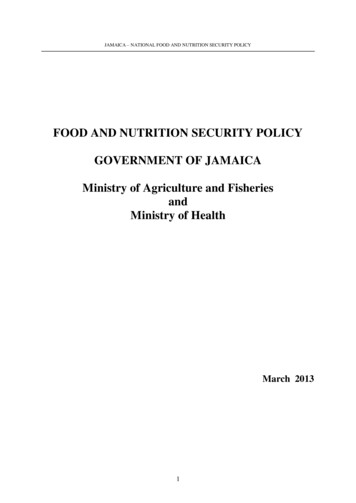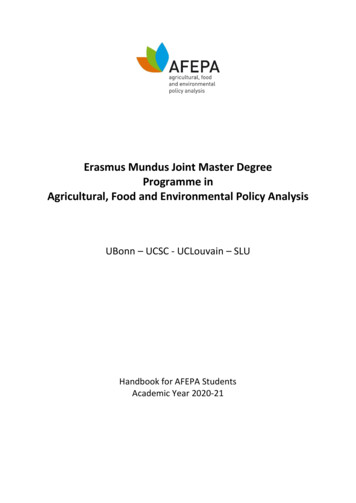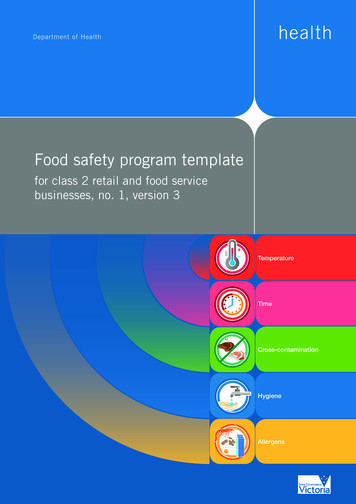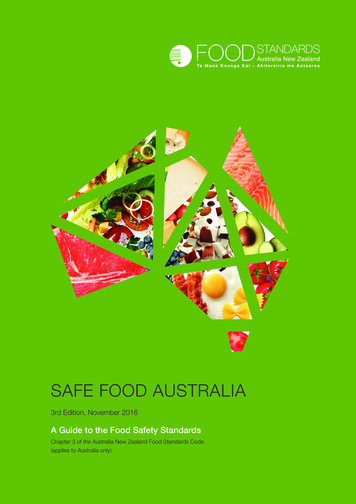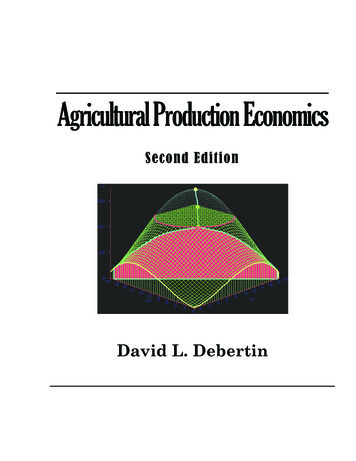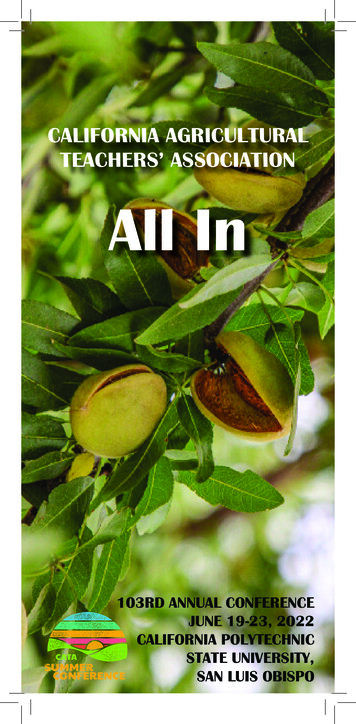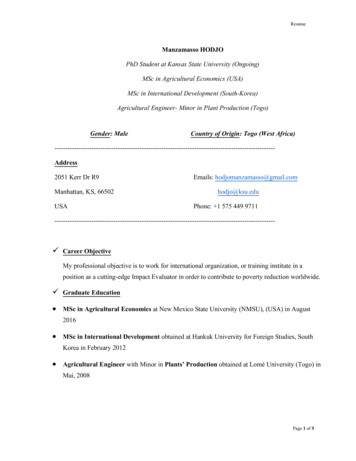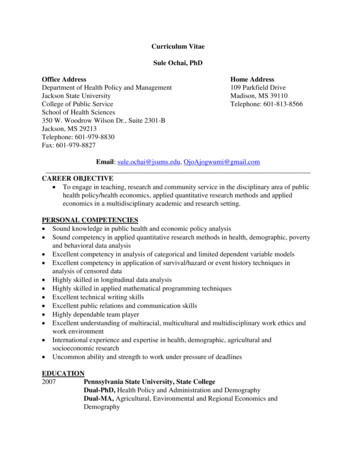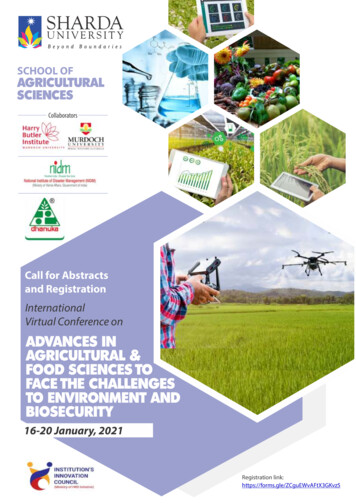
Transcription
SCHOOL OFSCHOOL atorsCall for Abstractsand RegistrationInternationalVirtual Conference onADVANCES INAGRICULTURAL &FOOD SCIENCES TOFACE THE CHALLENGESTO ENVIRONMENT ANDBIOSECURITY16-20 January, 2021Registration link:https://forms.gle/ZCguEWvAFtX3GKvz5
Announcing We are pleased to announce that Sharda University, Greater Noida, Uttar Pradesh, India is organizing an InternationalVirtual Conference Advances in Agricultural and Food Sciences to Face the Challenges to Environmentand Biosecurity from 16 to 20 January 2021 to commemorate the establishment of a state-of-the-art School ofAgricultural Sciences. The mission of the new school is to serve the needs of researchers, students, farmers, policyplanners and industries in the eld of agriculture and food sciences including food processing. National Instituteof Disaster Management, Government of India & Harley Butler Institute, Murdoch University, Western Australia areco-organizers of this conference.Humans have come a long way since the advent of agriculture and made unbelievable progress. This remarkableprogress is unfortunately accompanied by widespread and ongoing destruction through over-exploitationof natural resources and pollution of all kinds that are impacting on the climate of this planet and accentuatingnatural as well as anthropogenic disasters. Consequently, land and water resources needed to produce morefood are overstretched. Freshwater and marine food-stocks are as challenged as land-based food productionsystems. Hunger epidemic is still widespread with about two billion food insecure people starving andsuffering from malnutrition. In about 80 years there will be ve billion additional mouths to feed. Making plans andarrangements to provide safe and nutritious food to all should be the number one and most important globalpriority of the century. It will not be just a simple matter of opening more land, growing more crops and breedingmore livestock. Deserts are extending and new pests are emerging and spreading uncontrollably thereby puttingmore pressure on food production systems.The recent locust swarms, rust diseases, various viruses affecting crops, livestock and humans, and even the currentCOVID-19 pandemic are serious biosecurity risks. These are relevant to all nations of the world, more so to theunderdeveloped and developing countries who are economically and technologically weaker to manage suchrisks. Agriculture and food value chain are most important to not only feed people but also of key signi cance tothe management of biosecurity risks. Agriculture not only provides food, clothes, wood and raw materials to industry,but also provides various medicines to improve health or save life. Every country must be capable of sustaining itseconomy and safeguarding its human, livestock and plant resources from biosecurity risks of varied kinds. There isurgent need to optimise the efficiency of global food system. Food is lost all along the value chain from farm to fork.About 33% of the current global investment into food production is wasted, while at the same time billions ofpeople suffer from hunger and malnutrition. Development of food loss minimisation and effective food wasteutilisation plans are needed for all countries including cultural shift towards prevention of food waste at consumerlevel. It is necessary to review at this stage how well prepared agricultural and food science & technology are infacing the challenges of hunger, malnutrition and the recurrent serious challenges to biosecurity.The theme of this International Conference is Advances in Agricultural and Food Sciences to Face the EmergingGlobal Food Security and Biosecurity Challenges. This also includes environmental hazards, climate change andrelated impacts on pests and diseases of crops, livestock and humans.We want to take this opportunity to look forward with strength and optimism to view how will globalisation,information technology, new theoretical approaches, biotechnology, pharmacy, biosecurity and interdisciplinaryinteractions shape agricultural and food science technologies in future. It is expected that researchers will providesuggestions to policymakers about handling the post-COVID-19 challenges through efficient and sustainablesolutions. This conference will explore the availability of relatively new scienti c developments across all disciplinesthat could accelerate progress toward these goals.This International Conference will be held in virtualparticipants to attend without the bother toexpenses of a normal conference. Thethematic common and concurrentsession will have a Session Chair andlead speakers. There will be oraland poster sessions. Reputed specialistsmaintain high scholarly standards for theConference Chairs will select individualconference and nominate Session Chairss e l e c t i n g a n d e d i t i n g p a p e r s fo rand Scopus indexed reputed scienti cmode to enable large number oftravel long distances and hugeconference will feature regularsessions, listed below. Eachinvited/selected key-note andpresentations of selected papersin the respective elds, willconference.papers for presentation in thewho will also be in charge ofpublication in the proceedings,journals.
TENTATIVE SCHEME: JANUARY 16-20, 2021There will be daily about 5 hours in plenary and concurrent sessions.SYMPOSIUM THEME 1: Advances in Agricultural Production Systems Protected cultivation and precision farming Increasing nutrient use efficiency in crop production systems Reducing soil loss and degradation Optimizing water use in agriculture Mobilizing genetic diversity for crop improvement Mechanization in agriculture Medicinal, aromatic and under-utilized crops production Organic farming-Scope and Challenges Use of Arti cial intelligence in modern agricultureSYMPOSIUM THEME 2: Advances in Pests and Disease Forecasting and Management Systems Climate change impacts on pests and disease intensity and spread Zoonotic diseases, threats and its management in agricultural system Soil-borne pests and pathogens, diagnosis and management Virus diseases of plants, humans and livestock: Diagnosis and management Production, formulations and application of bio-pesticides in modern agriculture Human and plant pathogens: Role of scientists, society and GovernmentsSYMPOSIUM THEME 3: Managing Disasters and Global Biosecurity Risks Arti cial intelligence and other techniques for early and rapid detection and prevention of plant diseases Adaptations to climate change and disasters in agriculture and health sciences Early and rapid detection of foodborne pathogens Reducing food loss and waste throughout the supply chain Transgenic crops Transboundary pests and disease movement Prevention and management of epidemics and pandemics Integrated risk, resilience and sustainable development in agriculture Disaster management and risk reduction in agricultureSYMPOSIUM THEME 4: Advances in Functional Food and Phytopharmaceuticals Identi cation, production and use of Medicinal and aromatic plants Functional evaluation system of food and bioactive compounds The role and function mechanism of functional food and bioactive compounds in health promotion and chronicdiseases prevention Analysis and detection methods and separation and puri cation technologies of bioactive compounds Practical application of nutrigenomics, proteomics and metabolomics in functional food Research and development of functional food and dietary supplements Safety and risk assessment of functional food and bioactive compounds Industrial supervision, labeling and marking, laws, regulations and standards of functional food industry Food for health and immunity to pathogens Futuristic foodsSYMPOSIUM THEME 5: Advances in Food Quality and Safety Control Technology Safety and sanitation of raw food material and processed food Quality and safety control of food additives Detection technologies of food quality and safety Regulatory hurdle and product development Food safety risk assessment and risk communication Early-warning system of food quality and safety and its management mechanism Food safety tracking and management systems
CALL FOR PAPERS, POSTERS AND SPECIAL PANELS Sharda University invites individual papers to be presented in one of the above regular sections. We are also calling forproposals for special talks. Interested scholars are welcome to submit an abstract for an individual paper to a regular section.The deadline for individual paper abstracts is 20th December 2020. Subsequent information will be announced in the SecondCircular.Keynote addresses will be normally of 30 minutes and Lead-papers will be 20 minutes.Except for Key Note and Lead papers, each speakers for oral presentation will be allotted a time of 10 minutes, with anadditional 5 minutes for discussion. Poster presenters will be given about 5 minute each. (Some changes in duration may bemade in view of the number of presentations).GUIDELINES FOR THE ABSTRACT STRUCTUREThe acceptable word range for the abstract is 175 – 275 words. Please follow the format carefully andsend the abstract at email id: AAFS.IC2021@gmail.com. If the abstract template is not followed as it is,you may be asked for revisions. Your submission should be in English. We request you to sendinformative abstract (complete abstract) which is a summary of a paper's substance, purpose,methodology, results, and conclusion.Please send a brief biography along with coloured photograph of the presenting author (in JPEGformat with size 3.0 x 3.5 cm) together with the Abstract.ABSTRACT TEMPLATETitle of PaperPresenting Author's Name (Surname with Initials)Co-Author's Name/s (Surname with Initials)University / Institute, CountryE Mail / Mobile #Category – (Student / Delegate)AbstractThe abstract should be in a single paragraph, without indentation, compendious summary of apaper's substance including research question, purpose, methodology, results, and conclusionin 175 to 275 words.Keywords: Single, maximum 6 wordsThemes: (Related Theme)Fonts: Times New Roman; Font size 12 for text but for title 14. Paper size A4 with 2.5 cmmargins on each side
LAYOUT OF THE POSTERThe Poster should be in Landscape Format measuring 1.05 m (3.5 ft) x 0.9 m (3 ft).KEY DATES AND DEADLINES Individual speakers and titles of papers accepted for presentation will be announced through the conference website by20th December, 2020.First circular and call for papers10th November, 2020Registration deadline (Early Bird)10th December 2020Individual paper abstract deadline20th December 2020Second circular and acceptance of papers for oral/ poster presentation27th December, 2020Final Circular and Technical Programme2nd January, 2021Conference opens16th January 2021Conference ends20th January 2021REGISTRATIONRegistration link:https://forms.gle/ZCguEWvAFtX3GKvz5A nominal registration fee, as follows, will be charged to be able to fund awards to outstanding presenters amongscientists and students and technical costs.The invited key-note and Lead speakers will be exempted from payment of registration fee.Registration Fees (Early Bird) up to 10th December, 2020: Indian: Scientists: Rs.1000/-, Students: Rs.500/International: Scientists: USD 100/-, Students: USD 50/-, or equivalent other currencyRegistration Fees after 15th December 2020: Indian: Scientists: Rs.1200/-, Students: Rs.600/International: Scientists: USD 120/-, Students: USD 60/-, or equivalent other currencyFREESHIPS: A limited number of free registrations may be considered for deserving delegates unable to pay registrationfee. An application explaining circumstances may be sent along with abstract to the Organizing Secretary.Patrons: Platinum: Rs. 100,000/-, Gold: 50,000/displayed in the Conference) and Souvenir.Silver: Rs. 25,000/- (Logos and Information about patrons will beIn the spirit of the conference theme and spurred by our shared desire to encourage and support emerging scholars inwhose hands the future lies, PRIZES WILL BE AWARDED FOR THE MOST OUTSTANDING ORAL AND POSTERPRESENTATIONS by young scientists and currently enrolled Masters or Ph.D. students, selected by high level selectionCommittees for each theme.MODE OF PAYMENT OF REGISTRATION FEE AND SPONSORSHIPSIt can be deposited in the bank account directly through core/online banking with the details as given below:A/C NAME: Sharda University-SeminarICICI bank A/c: 025405005815KRISHNA APRA ROYAL PLAZA, D-2, E(ACB), ALPHA-1, GREATER NOIDA, GAUTAM BUDH NAGAR, UP- 201306IFSC Code: ICIC0000254SWIFT Code: ICICINBBCTSThe payment forthe Conference can alsobe made using Paytmusing the followingQR codeHowever, a scanned PDF copy of Demand Draft or Deposit/Transferslip must be sent through e-mail to the Organizing Secretary.Awards:Oral presentations: 15 (three in each Symposium);Poster Sessions: 15 (Three per session)Student Prizes: Oral presentations: 5(The amount of cash prizes/medals etc. will be decided by the Organizing Committee afterassessing the collection from registrations and patrons etc.)
PATRONSShri. P. K. GuptaHon. Chancellor,Sharda UniversityShri. Y.K. GuptaHon. Pro- Chancellor,Sharda UniversityMr. Prashant GuptaExecutive Director,Sharda UniversitySTEERING COMMITTEEChairman- Prof. Sibaram Khara, Vice-Chancellor, Sharda University Prof. P.L. Kariholu, Pro-Vice-Chancellor (Medical), Sharda UniversityProf. Girish Jammigumpula, Pro-Vice-Chancellor, Sharda University Prof. V.P.S. Arora, Distinguished Professor and Advisor to Vice Chancellor, Sharda UniversityProf. H.S.P. Rao, Former Dean-Research, Sharda University Prof. Bhuvnesh Kumar, Dean Research Sharda University Prof. Parma Nand, Dean, School of Engineering and Technology,Sharda University Dr. M.J. Khan, Chairman, Indian Chambers of Food and Agriculture, New Delhi Shri R.G. Agarwal, Chairman, Dhanuka Agritech Ltd. & President, ASSOCHAM, IndiaConvener- Prof. H. S. Gaur, Dean, Schools of Basic Sciences & Research and Agricultural Sciences Major General Shri Manoj Kumar Bindal, Executive Director, NIDMINTERNATIONAL ADVISORY COMMITTEEProf. P.K. Joshi, Ex-Director-Asia, IFPRI, New Delhi and former Director, ICAR-NAARM, Hyderabad, India Prof. Roland N. Perry, Professor Emeritus, University of Hertfordshire, UKProf. Richard Sikora, Professor Emeritus, University of Bonn, Germany Prof. Joe S. Sullivan, College of Agriculture & Natural Resources, University of Maryland, USAProf. Keith G. Davies, Professor (Nematology), Hertfordshire University, UK Prof. Mathew Abatan, Director, Pan Africa University, Institute of Land & Earth Sciences, Ibadan, NigeriaDr. Isa Bertling, UKZN- PMB, Scottsville 3209, South Africa Dr. Jun Song, Kentville Research and Development Centre, Kentville, CanadaProf. S.B. Sharma, Ex- Professor & Chair, Biosecurity and Food Security, Murdoch Univ., Australia Prof. Anil K. Gupta, HoD, ECDRM, NIDMORGANIZING COMMITTEEChairman- Prof. H. S. Gaur, Dean, Schools of Basic Sciences & Research and Agricultural SciencesCo-Chairman- Prof. S.B. Sharma, Ex- Professor & Chair, Biosecurity and Food Security, Murdoch Univ., AustraliaProf. B.S. Dhillon, Vice-Chancellor, Punjab Agricultural University, Ludhiana, IndiaProf. R.K. Mittal, Vice Chancellor, Sardar Vallabhbhai Patel University of Agriculture and Technology, Meerut, IndiaProf. Kusumakar Sharma, Professor, Sharda University & Former ADG (HRD), ICAR, New DelhiProf. Minshad Ansari, World BioProtection Forum, UK Prof. Mona Gamal, Dean, Egypt-Japan University of Science & Technology, Alexandria, EgyptProf. Manisha Jindal, Dean, School of Medical Sciences and Research, Sharda University, Greater Noida, India Prof. Vijender Singh, Dean, Pharmacy, Sharda University, Greater Noida, IndiaShri Kamal Kumar, Advisor, Dhanuka Agritech Ltd., India Prof. P.S. Deshmukh, Virginia, USA Prof. N.B. Singh, Professor-Emeritus, Sharda University, Greater Noida, IndiaProf. Ashok Kumar, Professor (Physics), Sharda University, Greater Noida, India Prof. Vinod Joshi, Ex-Scientist-G, ICMR, now Professor, Sharda University, Greater NoidaProf. Sher Ali, Ex-Director (Res.), Jamia Millia Islamia, now Distinguished Prof., Sharda University, G. Noida, India Prof. D.S. Rana, School of Agricultural Sciences, Sharda University, Greater Noida, IndiaProf. Dolly Wattal Dhar, School of Agricultural Sciences, Sharda University, Greater Noida, India Prof. S.V.S. Chaudhary, Ex-Prof. & Head, YS Parmar University of Horticulture & Forestry, Solan, HP, IndiaProf. Subhash Chander, Principal Scientist, Indian Agricultural Research Institute, New Delhi Prof. Rajesh Kumar, Central University of Rajasthan, Ajmer, IndiaDr. Sangita Ladha, Business Director, Rivulis Irrigation India Pvt. Ltd. Shri Ashish K. Panda, Consultant, NIDM, New Delhi, IndiaDr. Raleema Farooq, Medical Officer, Health and Wellness Centre, National Health Mission, J&K, India Dr. Abhilasha S. Mathuria, Head, Life Sciences, Sharda University, Greater Noida, IndiaDr. Shalini G. Rudra, Food Scientist, Indian Agricultural Research Institute, New Delhi, India Treasurer- Dr. Chongtham Alleley Devi, School of Agricultural SciencesOrganizing Secretary- Prof. Saleem Siddiqui, School of Agricultural Sciences, Sharda University, IndiaCOORDINATORSDr. Annete Angel, Biotechnology and Biosecurity Dr. Uzma Manzoor, Agricultural SciencesDr. Sujata Pandit, Food Science and Technology Dr. Suman, Environment, Climate and Disaster ManagementContact UsOrganizing Secretary: AAFS.IC2021@gmail.comAny urgent enquiries: hs.gaur@sharda.ac.in, saleem.siddiqui@sharda.ac.inMob. 91-7011045329, 91-9416397847For information the conference please visit the ral-and-food-sciences-from-16th-20th-january-2021
GUIDELINES FOR THE ABSTRACT STRUCTURE The acceptable word range for the abstract is 175 - 275 words. Please follow the format carefully and send the abstract at email id: AAFS.IC2021@gmail.com. If the abstract template is not followed as it is, you may be asked for revisions. Your submission should be in English. We request you to send
